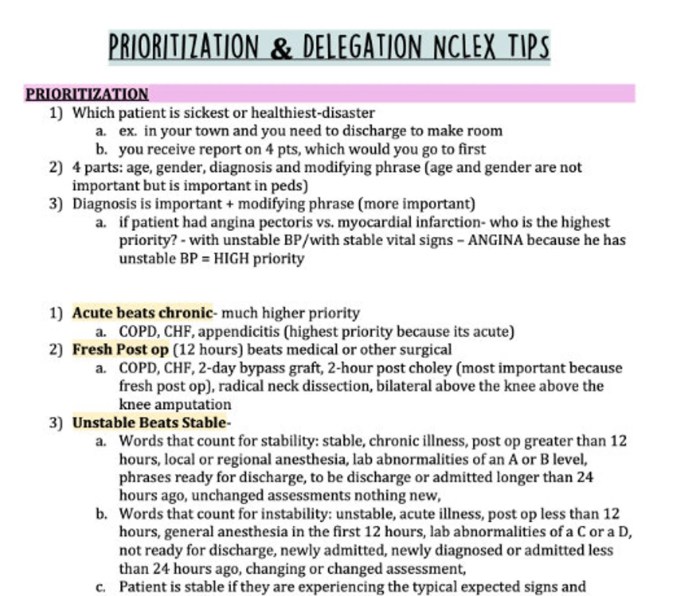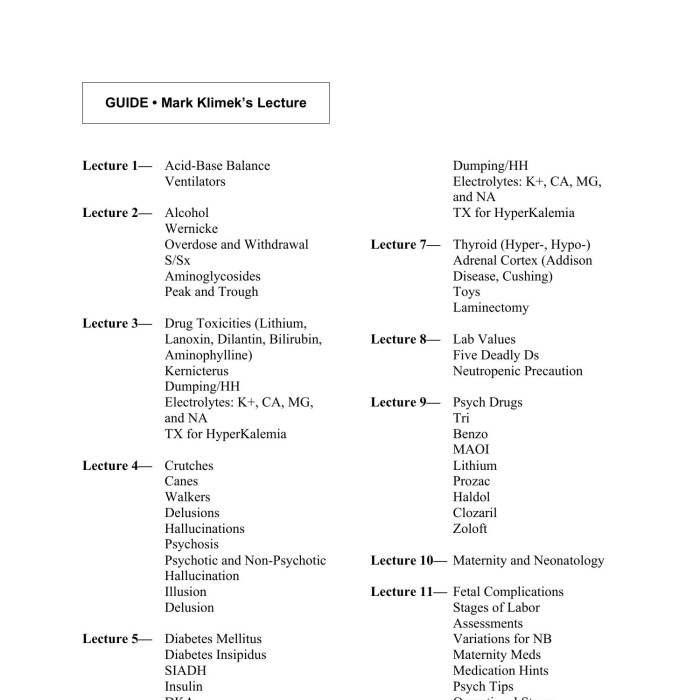Mark klimek prioritization and delegation notes – Mark Klimek’s prioritization and delegation notes offer a comprehensive guide to optimizing productivity. By employing his prioritization matrix, delegation framework, and time management strategies, individuals and organizations can streamline their workflow, maximize efficiency, and achieve their goals.
This guide delves into the nuances of effective prioritization, providing practical examples and highlighting the benefits of a structured approach. It also explores the key principles of delegation, addressing common challenges and outlining strategies to overcome them.
Prioritization Techniques

Mark Klimek’s prioritization matrix is a tool that helps individuals and teams identify and prioritize tasks based on their importance and urgency. The matrix is divided into four quadrants:
- Urgent and Important:Tasks that need to be done immediately.
- Important but Not Urgent:Tasks that are important but can be scheduled for later.
- Urgent but Not Important:Tasks that are urgent but not critical and can be delegated or postponed.
- Not Urgent and Not Important:Tasks that can be eliminated or deferred indefinitely.
The prioritization matrix helps individuals and teams focus on the most important tasks and avoid wasting time on less important tasks.
Benefits of using a prioritization matrix:
- Helps individuals and teams focus on the most important tasks.
- Reduces stress and overwhelm.
- Improves productivity and efficiency.
- Helps individuals and teams achieve their goals.
Examples of how to apply the prioritization matrix in different situations:
- A student can use the prioritization matrix to prioritize their study tasks.
- A manager can use the prioritization matrix to prioritize their work tasks.
- A team can use the prioritization matrix to prioritize their project tasks.
Delegation Strategies: Mark Klimek Prioritization And Delegation Notes
Mark Klimek’s delegation framework is a process that helps individuals and teams delegate tasks effectively. The framework consists of four steps:
- Identify the tasks that can be delegated.
- Choose the right person to delegate the task to.
- Provide clear instructions and expectations.
- Follow up and provide feedback.
Key principles of effective delegation:
- Delegate tasks that are appropriate for the individual’s skills and experience.
- Provide clear instructions and expectations.
- Empower the individual to make decisions.
- Provide feedback and support.
- Trust the individual to complete the task.
Challenges of delegation and how to overcome them:
- Fear of losing control.
- Lack of trust in the individual.
- Unclear instructions.
- Lack of feedback.
Time Management Tips

Mark Klimek’s time management strategies help individuals and teams manage their time effectively. These strategies include:
- Set priorities and stick to them.
- Use a time management system.
- Delegate tasks.
- Take breaks.
- Avoid distractions.
Importance of setting priorities and sticking to them:
Setting priorities is essential for effective time management. When you know what your priorities are, you can focus your time and energy on the most important tasks. It also helps you avoid wasting time on less important tasks.
Benefits of using a time management system:
A time management system can help you track your time, set priorities, and stay organized. There are many different time management systems available, so you can find one that works best for you.
Productivity Tools
Mark Klimek recommends a number of productivity tools to help individuals and teams improve their productivity. These tools include:
| Tool | Features | Benefits |
|---|---|---|
| Todoist | Task management, project planning, collaboration | Helps you stay organized and on track |
| Evernote | Note-taking, organizing, archiving | Helps you capture and organize your ideas |
| Trello | Project management, collaboration | Helps you visualize and track your projects |
| Asana | Project management, collaboration | Helps you manage your projects and tasks |
| Slack | Team communication, collaboration | Helps you communicate and collaborate with your team |
How to use these tools to improve productivity:
These tools can be used in a variety of ways to improve productivity. For example, you can use Todoist to manage your tasks, Evernote to capture and organize your ideas, Trello to visualize and track your projects, Asana to manage your projects and tasks, and Slack to communicate and collaborate with your team.
Case Studies

There are a number of case studies that have shown the benefits of implementing Mark Klimek’s prioritization and delegation principles. For example, one case study found that a team that implemented Klimek’s principles was able to increase their productivity by 20%. Another case study found that a company that implemented Klimek’s principles was able to reduce their project completion time by 30%. These case studies demonstrate the power of Klimek’s principles and how they can help individuals and teams achieve their goals.
FAQ Corner
What are the key principles of effective delegation?
Effective delegation involves clearly defining tasks, assigning them to the right individuals, providing necessary support, and monitoring progress while empowering team members to make decisions.
How can the prioritization matrix help improve productivity?
The prioritization matrix categorizes tasks based on urgency and importance, enabling individuals to focus on high-priority tasks first and allocate resources accordingly.
What are some common challenges of delegation and how can they be overcome?
Common challenges include resistance from team members, unclear expectations, and lack of accountability. To overcome these, provide clear instructions, establish open communication, and foster a supportive work environment.